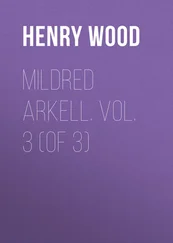Henry Wood - Johnny Ludlow, Sixth Series
Здесь есть возможность читать онлайн «Henry Wood - Johnny Ludlow, Sixth Series» — ознакомительный отрывок электронной книги совершенно бесплатно, а после прочтения отрывка купить полную версию. В некоторых случаях можно слушать аудио, скачать через торрент в формате fb2 и присутствует краткое содержание. Жанр: foreign_prose, literature_19, foreign_antique, на английском языке. Описание произведения, (предисловие) а так же отзывы посетителей доступны на портале библиотеки ЛибКат.
- Название:Johnny Ludlow, Sixth Series
- Автор:
- Жанр:
- Год:неизвестен
- ISBN:нет данных
- Рейтинг книги:5 / 5. Голосов: 1
-
Избранное:Добавить в избранное
- Отзывы:
-
Ваша оценка:
- 100
- 1
- 2
- 3
- 4
- 5
Johnny Ludlow, Sixth Series: краткое содержание, описание и аннотация
Предлагаем к чтению аннотацию, описание, краткое содержание или предисловие (зависит от того, что написал сам автор книги «Johnny Ludlow, Sixth Series»). Если вы не нашли необходимую информацию о книге — напишите в комментариях, мы постараемся отыскать её.
Johnny Ludlow, Sixth Series — читать онлайн ознакомительный отрывок
Ниже представлен текст книги, разбитый по страницам. Система сохранения места последней прочитанной страницы, позволяет с удобством читать онлайн бесплатно книгу «Johnny Ludlow, Sixth Series», без необходимости каждый раз заново искать на чём Вы остановились. Поставьте закладку, и сможете в любой момент перейти на страницу, на которой закончили чтение.
Интервал:
Закладка:
I shook my head, not seeing grounds to agree with Owen. He resumed:
“The next morning, between nine and ten, I was in the shop, putting a pint of cream which had been ordered into a can, when to my surprise Matilda walked in, cool and calm. She said she had come to tell me that the man I had seen leave the house was her brother. He had fallen into trouble through having become security for a fellow workman, had had all his things sold up, including his tools, and had walked every step of the way—thirty miles—to ask her if she could help him. She did help him as far as she could, giving him what little money she had by her, and Jane Cross had added ten shillings to it. He had got in only at dusk, she said, had taken some supper with them, and left again afterwards, and that she was letting him out at the gate when I must have been passing it. She did not see me, for her eyes were dim with crying: her heart felt fit to break in saying farewell. That was the truth, she declared, and that her brother had had no more to do with Jane’s death than she or I had; he was away again out of Saltwater the same night he came into it.”
“Well? Did you not believe her?”
“No, sir,” answered Owen, boldly. “I did not. If this was true, why should she have gone off into that smothered shriek in the churchyard when I mentioned him, and rush away in a fright?”
I could not tell. Owen’s words set me thinking.
“I did not know which of the two girls it was who let the man out that Wednesday night, for I did not clearly see; but, sir, the impression on my mind at the moment was, that it was Jane Cross. Jane Cross, and not Matilda. If so, why does she tell me this tale about her brother, and say it was herself?”
“And if it was Jane Cross?”
Owen shook his head. “All sorts of notions occur to me, sir. Sometimes I fancy that the man might have been Jane’s sweetheart, that he might have been there again on the Monday night, and done the mischief in a quarrel; and that Matilda is holding her tongue because it is her brother. Let the truth be what it will, Matilda’s manner convinces me of one thing: that there’s something she is concealing, and that it is half frightening her wits out of her.–You are going to leave Saltwater, I hear, sir,” added the young man in a different tone, “and I am glad to have the opportunity of saying this, for I should not like you to carry away any doubt of me. I’ll bring the matter to light if I can.”
Touching his hat, he walked onwards, leaving my thoughts all in a whirligig.
Was Owen right in drawing these conclusions?—or was he purposely giving a wrong colouring to facts, and seeking craftily to throw suspicion off himself? It was a nice question, one I could make neither top nor tail of. But, looking back to the fatal evening, weighing this point, sifting that, I began to see that Matilda showed more anxiety, more terror, than she need have shown before she knew that any ill had happened. Had she a prevision, as she stood at the door with the jug of ale in her hand, that some evil might have chanced? Did she leave some individual in the house with Jane Cross when she went to the Swan to get the ale?—and was it her brother? Did she leave Owen in the house, and was she screening him?
“Why, Matilda! Is it you?”
It was fourteen months later, and autumn weather, and I had just arrived in London at Miss Deveen’s. My question to Matilda, who came into my dressing-room with some warm water to wash off the travelling dust, was not made in surprise at seeing her , for I supposed she was still in service at Miss Deveen’s, but at seeing the change in her. Instead of the healthy and, so to say, handsome girl known at Saltwater, I saw a worn, weary, anxious-looking shadow, with a feverish fire in her wild dark eyes.
“Have you been ill, Matilda?”
“No, sir, not at all. I am quite well.”
“You have grown very thin.”
“It’s the London air, sir. I think everybody must get thin who lives in it.”
Very civilly and respectfully, but yet with an unmistakable air of reticence, spoke she. Somehow the girl was changed, and greatly changed. Perhaps she had been grieving after Jane Cross? Perhaps the secret of what had happened (if in truth Matilda knew it) lay upon her with too heavy a weight?
“Do you find Matilda a good servant?” I asked of Miss Deveen, later, she and I being alone together.
“A very good servant, Johnny. But she is going to leave me.”
“Is she? Why?”
Miss Deveen only nodded, in answer to the first query, passing over the last. I supposed she did not wish to say.
“I think her so much altered.”
“In what way, Johnny?”
“In looks: looks and manner. She is just a shadow. One might say she had passed through a six months’ fever. And what a curious light there is in her eyes!”
“She has always impressed me with the idea of having some great care upon her. None can mistake that she is a sorrowful woman. I hear that the other servants accuse her of having been ‘crossed in love,’” added Miss Deveen, with a smile.
“She is thinner even than Miss Cattledon.”
“And that, I daresay you think, need not be, Johnny! Miss Cattledon, by the way, is rather hard upon Matilda just now: calls her a ‘demon.’”
“A demon! Why does she?”
“Well, I’ll tell you. Though it is only a little domestic matter, one that perhaps you will hardly care to hear. You must know (to begin with) that Matilda has never made herself sociable with the other servants here; in return they have become somewhat prejudiced against her, and have been ready to play her tricks, tease her, and what not. But you must understand, Johnny, that I knew nothing of the state of affairs below; such matters rarely reach me. My cook, Hall, was especially at war with Matilda: in fact, I believe there was no love lost between the two. The girl’s melancholy—for at times she does seem very melancholy—was openly put down by the rest to the assumption that she must have had some love affair in which the swain had played her false. They were continually worrying her on this score, and it no doubt irritated Matilda; but she rarely retorted, preferring rather to leave them and take refuge in her room.”
“Why could they not let her alone?”
“People can’t let one another alone, as I believe, Johnny. If they did, the world would be pleasanter to live in than it is.”
“And I suppose Matilda got tired at last, and gave warning?”
“No. Some two or three weeks ago it appears that, by some means or other, Hall obtained access to a small trunk; one that Matilda keeps her treasures in, and has cautiously kept locked. If I thought Hall had opened this trunk with a key of her own, as Matilda accuses her of doing, I would not keep the woman in my house another day. But she declares to me most earnestly—for I had her before me here to question her—that Matilda, called suddenly out of her chamber, left the trunk open there, and the letter, of which I am about to tell you, lying, also open, by its side. Hall says that she went into the room—it adjoins her own—for something she wanted, and that all she did—and she admits this much—was to pick up the letter, carry it downstairs, read it to the other servants, and make fun over it.”
“What letter was it?”
“Strictly speaking, it was only part of a letter: one begun but not concluded. It was in Matilda’s own hand, apparently written a long time ago, for the ink was pale and faded, and it began ‘Dearest Thomas Owen. The–’”
“Thomas Owen!” I exclaimed, starting in my chair. “Why, that is the milkman at Saltwater.”
“I’m sure I don’t know who he is, Johnny, and I don’t suppose it matters. Only a few lines followed, three or four, speaking of some private conversation that she had held with him on coming out of church the day before, and of some reproach that she had then made to him respecting Jane Cross. The words broke suddenly off there, as if the writer had been interrupted. But why Matilda did not complete the letter and send it, and why she should have kept it by her all this time, must be best known to herself.”
Читать дальшеИнтервал:
Закладка:
Похожие книги на «Johnny Ludlow, Sixth Series»
Представляем Вашему вниманию похожие книги на «Johnny Ludlow, Sixth Series» списком для выбора. Мы отобрали схожую по названию и смыслу литературу в надежде предоставить читателям больше вариантов отыскать новые, интересные, ещё непрочитанные произведения.
Обсуждение, отзывы о книге «Johnny Ludlow, Sixth Series» и просто собственные мнения читателей. Оставьте ваши комментарии, напишите, что Вы думаете о произведении, его смысле или главных героях. Укажите что конкретно понравилось, а что нет, и почему Вы так считаете.












